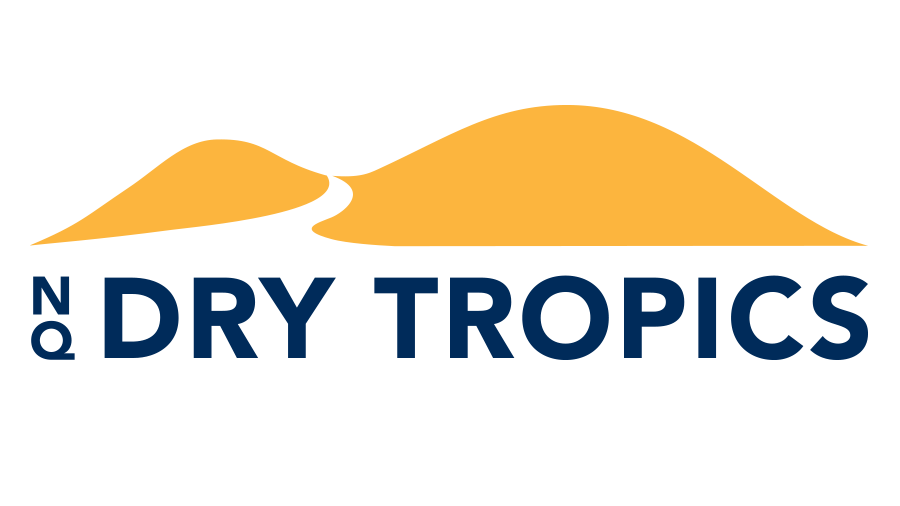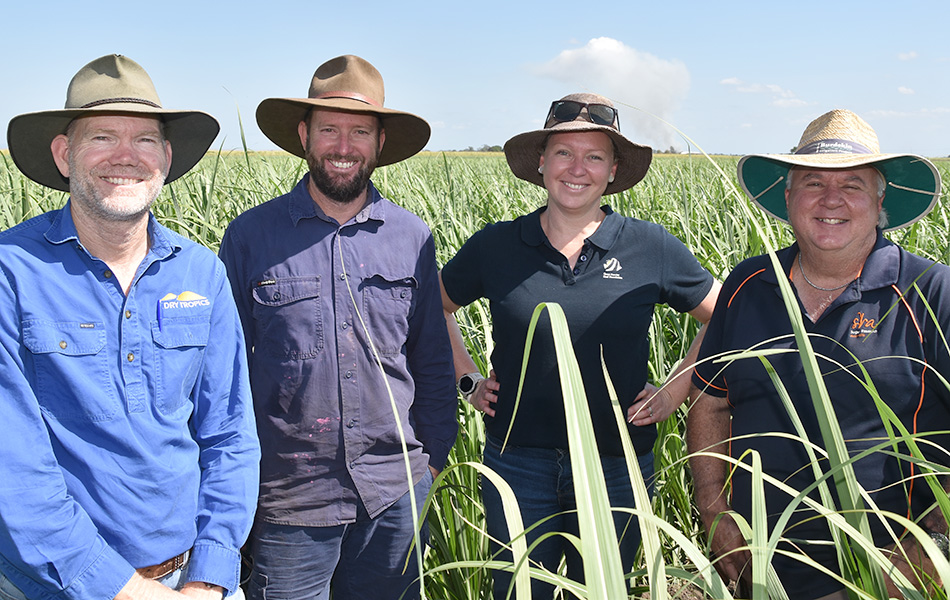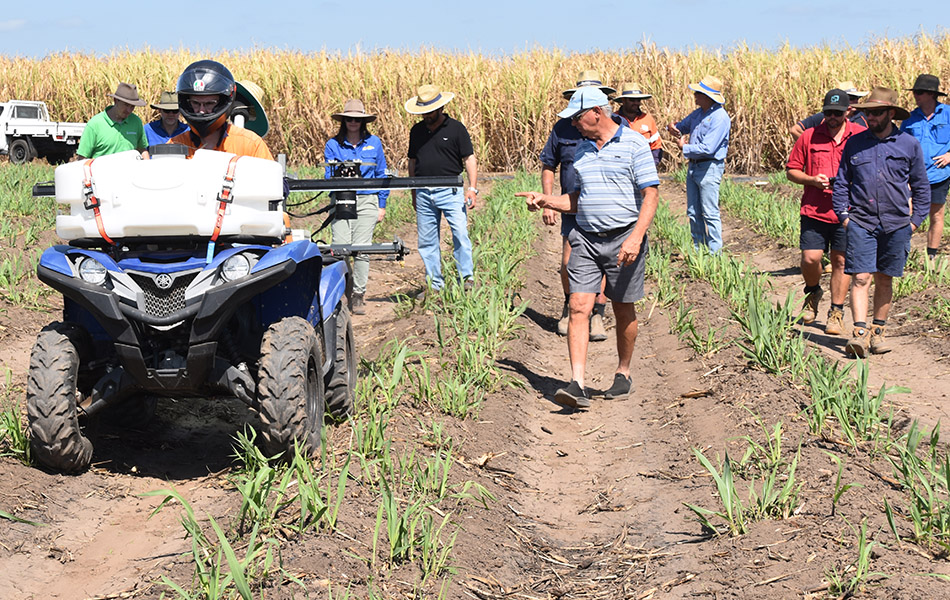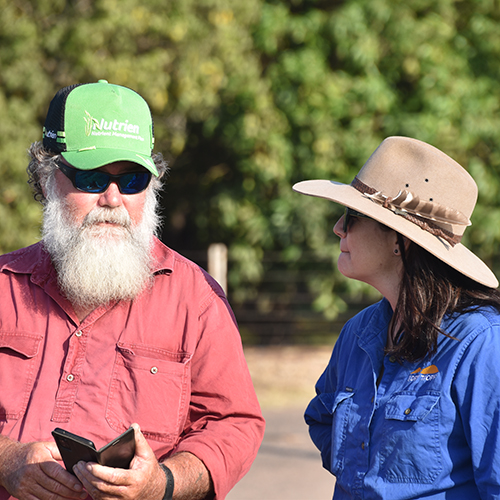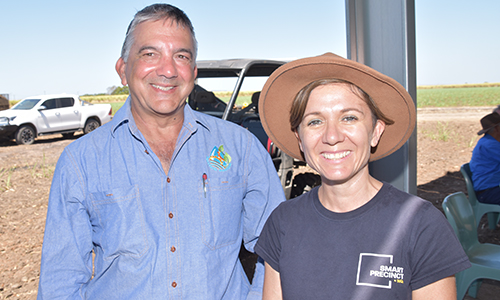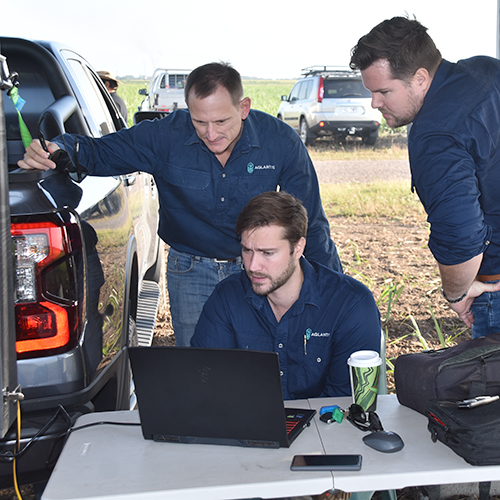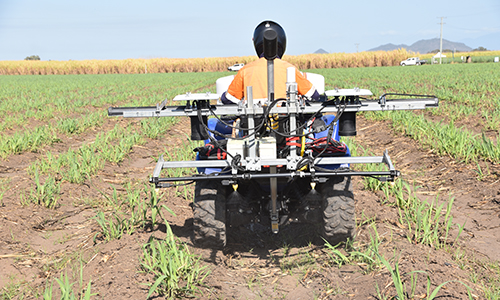Cane farmers keep up with the leading edge of technology
Lower Burdekin cane growers heard about the “latest and greatest” innovations available to improve efficiency, profitability and sustainability at a Field Day on Aaron Linton’s Home Hill farm recently.
About 30 growers and extension officers:
- saw the latest developments in robotic weed sprayers in action;
- inspected an ongoing trial of NDrip irrigation tape laid above ground in a dual row cane crop;
- were updated on the progress and early findings in the ongoing Burdekin Irrigation Project;
- were given a rundown on the untapped power of GPS devices being underused in farm machinery; and
- were shown technology that allows irrigation automation to be achieved in small, easy steps.
Alex Olsen and Jake Wood from AutoWeed in Townsville demonstrated how the automatic spot sprayer could slash the amount of herbicide needed to control inter-row weeds.
Artificial intelligence allows the AutoWeeder to spot spray weeds without having to blanket spray the entire paddock.
An imaging system scans the ground being traversed, checking each frame with an extensive database of imagery showing examples of the target plant.
“It takes a fraction of a second to make a decision and, if it recognises a weed, turns on the appropriate sprayer for just long enough for the spray to cover the plant,” Alex Olsen, one of the company’s co-founders said.
To achieve that, the system refers to tens of thousands of images of each target weed so the machine can learn what it looks like at different times of the day, in wet or dry, hot or cool conditions to ensure reliable recognition in the field.
Reductions in pesticide use of up to 30 per cent have been observed during field trials, suggesting significant cost savings for farmers and reduced risks to water quality were both possible.
Sugar Research Australia (SRA) – Burdekin Manager Terry Granshaw said the Burdekin Irrigation Project (BIP) continued to deliver irrigation and energy savings for cane growers in the Lower Burdekin.
“The first step is to establish an accurate understanding of how much water the farm uses and where, before identifying areas that can be improved,” he said.
A trial using NDrip tape on the surface in dual row cane generated a lot of interest among growers and extension officers.
Mr Granshaw said even if the method adopted during the trial proved impractical, there were lessons to be learnt that would contribute to better methodology down the track.
Grower Joe Linton agreed, saying “failures” were worthwhile because of the knowledge gained during the exercise.
The untapped power of GPS devices was the target of an informative presentation by the team from Burdekin-based precision farming company, Aglantis.
Luke and Carl Malan and Barry Cross are passionate about the potential of existing devices simply by ensuring each GPS is properly calibrated and set up for the farm on which they’re used.
GPS is particularly good at collecting data for recordkeeping to better inform farming decisions and to demonstrate compliance with the reef protection regulations.
The field day was supported by the Precision Agriculture Project, the Lower Burdekin Water Quality Program and the Lower Burdekin Smart Irrigation Project, funded by the partnership between the Australian Government’s Reef Trust and the Great Barrier Reef Foundation, and the partnership between the Great Barrier Reef Foundation and Lion Corporate.
Hands-on inspection. Pictured looking at an experiment with drip tape on the surface between a double row of cane are, from left: NQ Dry Tropics Program Manager Rob Hunt, grower Aaron Linton, Great Barrier Reef Foundation Program Manager Carolyn Trewin and SRA – Burdekin manager Terry Granshaw.
Innovations Day participants follow the AutoWeed robot sprayer as it travels down a row on Aaron Linton’s Home Hill farm.
Grower Andrew Balmer and NQ Dry Tropics Senior Project Officer Sarah Willis.
One innovator to another… Agritech Solutions Managing Director Steve Attard and Smart Precinct NQ Business Advisor Shelley Grainger.
The Aglantis team members double-check their presentation.
The AutoWeed sprayer turns individual nozzles on the spray boom on and off as it detects weeds.
